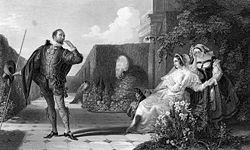This article has multiple issues. Please help improve it or discuss these issues on the talk page . (Learn how and when to remove these messages)
|
| Feste | |
|---|---|
| Twelfth Night character | |
 Actor Louis H. Chrispijn as Feste, ca. 1899 | |
| Created by | William Shakespeare |
Feste is a fictional character in William Shakespeare's comedy Twelfth Night . He is a fool (royal jester) attached to the household of the Countess Olivia. He has apparently been there for some time, as he was a "fool that the Lady Olivia's father took much delight in" (2.4). Although Olivia's father has died within the last year, it is possible that Feste approaches or has reached middle age, though he still has the wit to carry off good 'fooling' when he needs to, and the voice to sing lustily or mournfully as the occasion demands. He is referred to by name only once during the play, in answer to an inquiry by Orsino of who sang a song that he heard the previous evening. Curio responds "Feste, the jester, my lord; a fool that the lady Olivia's father took much delight in. He is about the house" (2.4). Throughout the rest of the play, he is addressed only as "Fool," while in the stage directions he is mentioned as "Clown."
Contents
- Performances
- Songs/poems
- O Mistress Mine
- Come Away, Death
- Hey Robin, Jolly Robin
- I Am Gone, Sir
- Feste's Song
- Quotes
- In the arts
- References
Feste seems to leave Olivia's house and return at his pleasure rather too freely for a servant. (At the very least he is doing some free-lance entertaining over at the house of Duke Orsino (2.4).) His habit of roaming gets him into trouble with Olivia: when we first see him, he must talk his way out of being turned out—a grim fate in those days—for being absent, as it were, without leave. He succeeds, and once back in his lady's good graces, he weaves in and out of the action with the sort of impunity that was reserved for a person nobody took seriously.

